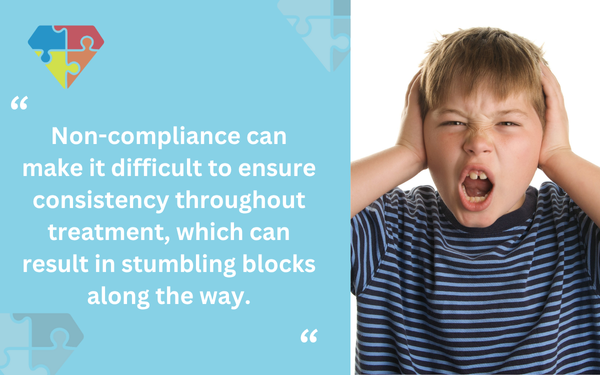Managing Client Refusals without Punishment
It’s not uncommon for children to not comply with directions and instructions. This is especially true of some children with autism spectrum disorder (ASD), who may show a larger preference for doing things a certain way, in a certain place or at a certain time than their neurotypical peers.
Getting children to comply with directions and instructions is obviously an important aspect of any form of teaching, but especially so in a structured intervention such as applied behavior analysis (ABA therapy).
The question becomes, then, how can therapists help their patients work through noncompliance to ensure they learn skills and behaviors so they can meet their ABA therapy goals?
In this article, we’ll discuss managing client refusals without punishment in ABA therapy.
| Key Takeaways |
|---|
| Refusals are common and natural in children with ASD during ABA therapy. |
| ABA therapy does not involve punishment for non-compliance. |
| Positive reinforcement and motivational strategies are key to encouraging participation. |
| Functional Behavior Assessments (FBA) help uncover the root causes of refusals. |
| Consistency, personalization, and respect build trust and lead to better outcomes. |
Table Of Contents
Why Compliance is Important in ABA Therapy
For ABA therapy interventions to be applied consistently and effectively, it requires children who receive it to be compliant. Essentially, this means they are able to receive the information that is being presented to them, and actively take a part in the learning.
Non-compliance can make it difficult to ensure consistency throughout treatment, which can result in stumbling blocks along the way. This can lead to children not gaining the skills or behaviors that are part of their treatment goals — or it taking them longer to do so.

ABA therapy is grounded in scientific evidence. For that evidence to be accurate for each patient, therapists need to collect and analyze data during sessions. If a child is refusing to do the therapy, it can make it difficult to accurately collect data, which in turn can make it challenging to track their progress toward goals and make data-based decisions.
Not only that, but compliance is a form of rapport and trust. When ABA therapists are able to get their patients to comply, they’re better able to build a stronger bond that’s based on trust, which ultimately leads to more successful outcomes.
| Do | Don’t |
|---|---|
| Use positive reinforcement to encourage compliance | Punish or withhold items in response to refusals |
| Tailor lessons to the child’s interests (e.g., using toy cars) | Deliver generic lessons without engagement strategies |
| Implement consistent strategies across settings | Change approach randomly or inconsistently |
| Conduct an FBA to understand refusal behaviors | Assume all refusals are intentional defiance |
What Client Refusals in ABA Therapy Might Look Like
Non-compliance can look differently for each child. It can be as simple as ignoring a therapist’s instructions when they tell them to sit down, stand up or point to something.
Other examples of client refusal include refusing to participate in therapy, by either pushing things away or saying “no;” exhibiting escape behavior, such as trying to run or walk away from where the therapy is being administered; trying to negotiate with the therapist to do something else, or protesting altogether; or even partial compliance, where they might begin to follow instructions but then not complete the task.
ABA therapists are trained to spot the different types of client refusals so that they can help their patients manage and work through them.
How to Manage Client Refusals without Punishment
Despite some negative stigmas that still exist, ABA therapy does not use punishment in any way. Instead of punishing children when they are non-compliant, or withholding something from them, therapists have other tools and strategies at their disposal to manage refusals.
First and foremost, they need to ensure that they are consistently implementing the different strategies, no matter what setting they’re in or skill they’re targeting. This will help signify to the patient that it’s time to do something.
They can also work on building motivation for engaging in ABA therapy. One example might be basing a lesson around the child’s preferred activities or interests, such as teaching them to count by using toy cars.
Positive reinforcement is a great way to build motivation, increase engagement and keep children wanting to learn more. It’s a great way to encourage children to comply, even as the demands or requests get exceedingly more challenging.
All of these strategies, of course, need to be based on the child’s particular strengths, challenges and preferences — all of which can be discovered through a Functional Behavior Assessment, or FBA.
The FBA can help the therapy team understand the possible reasons behind a child’s non-compliance, which can then help them develop interventions tailored to what they need and what will help support them best.
Blue Gems ABA Manages Client Refusals without Punishment
It’s not uncommon for children with ASD to be non-compliant in ABA therapy. From time to time, they might exhibit refusal behaviors, which can stand in the way of effective treatment.
At Blue Gems ABA, we manage client refusals without punishment by relying on the tried-and-true principles and strategies of ABA therapy. Through positive reinforcement, consistent application of intervention and much more, we help children work through their challenges and stay motivated to learn.
To learn more, please contact us today.
| Frequently Asked Questions (FAQ) |
|---|
| What does refusal look like in ABA therapy? It may include ignoring instructions, pushing materials away, saying “no,” or attempting to leave the area. |
| Is punishment ever used in ABA? No. Ethical ABA therapy avoids punishment and uses positive, proactive strategies. |
| How does positive reinforcement help? It increases motivation, improves engagement, and promotes consistent participation. |
| What role does consistency play? Consistency in strategy helps children know what to expect, increasing their comfort and cooperation. |
| Why is FBA important? It identifies the underlying cause of refusals and guides customized interventions to support the child. |




